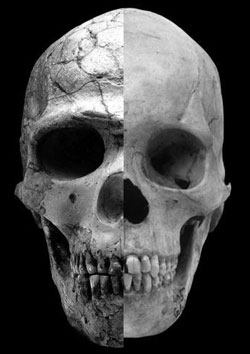While by no means a smoking gun, there is still a reasonable amount of empirical evidence on the notion that socialization and testosterone are negatively correlated.
Archaeological Evidence
From the archaeological side, Robert Cieri submits that certain skeletal features (heavy brows, upper face) are directly related to testosterone levels. Below is a comparison of an ancient human skull and a near-modern skull.
Zoological Evidence
Animal cognition researchers and Brian Hare (Duke) has published a well-received paper that studied Siberian foxes and chimpanzees and noted the degree of socialization and testosterone level respectively. It is thought humans might be able to be analyzed this way as well:
If we're seeing a process that leads to these changes in other animals, it might help explain who we are and how we got to be this way. -- Brian Hare
Other Findings
Moreover, in modern times, due to the welfare state and the enfranchisement of women, the ancient narrative of men as brutal, territorial providers of resources is becoming outdated. I saw a study somewhere showing t-levels falling by 3% with each generation. To me, it begs the question, could it be that modern society and high testosterone levels are diametrically opposed...
Question
Given there is a natural tendency for testosterone levels in humans to decrease as cooperation increases as shown by the scientific findings, what societal mechanisms does my world need to counteract this tendency? This question is particularly intriguing given that the society in my world is a peaceful one. An alternative way of conceptualizing the question is can a peaceful society still retain males with high levels of testosterone (through societal means only)?
Quality Metric
What do we mean by "societal mechanisms"?: By this I just mean, limit your answer to known sociology only. This is primarily a society question, and so technology-based, evolution-based or genetic-engineering-based answers are not preferred. Answers that use only sociology would score higher in this quality metric.
Note: Of course I take the point that technology and evolution are important for sociology, but such things should not be the defining characteristic of the answer
Further Clarifications and Assumptions (aka why its not PoB or too broad)
- Clearly this analysis is not intended to be robust to every male. Male testosterone levels are not uniform in a population. Not to put too fine a point on it, but the spectrum ranges from Shakespeare to Floyd Mayweather. Instead, we simply are concerned with the mean/median male of the society.
- Answers have to be given using the framework of societal mechanisms only. In other words, This is important, because otherwise I would concede the question would be too broad.
- The society in my world is advanced and peaceful. There might be an occasional skirmish or conflict, but large scale armed conflict is a non-issue. By "advanced" think, rich, little to no problems with income inequality, or unemployment, ect
- How high is high? I just mean high levels of testosterone in the relative sense such that there is no longer a trend of decline. The testosterone levels don't have to increase exponentially or anything. But they need to stay high and stable in the long-run.
- Don't cheat the metric. You know the joke, if Bill Gates moves into your neighborhood, then everyone becomes a millionaire because that's how averages work? I don't want this in my t-levels. So please don't propose a separate sub-species of male having 10^8 ng/dL testosterone that performs gladiatorial combat for the viewing pleasure of the effete males. That is to say, we want to keep t-levels high for males as uniformly as possible
- Don't worry about t-levels decreasing with age, that's fine, but don't kill everyone who has low t-levels either!!
- Everything else, like technology, can assumed to be earth-like, and near-future.

